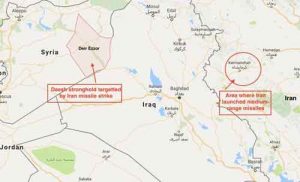The proposal follows an Iranian rocket strike on Islamic State in Syria that analysts called retaliation for twin terror attacks in Tehran and a warning to regional rivals.
The bill would raise the Islamic Revolutionary Guard Corps (IRGC) budget to $8 billion, in addition to an already approved five-year development plan that requires the government to earmark at least 5 percent of the national budget to defense, particularly development of the multidimensional missile program.
The June 18 strike — the first time Iran fired missiles outside its borders in 30 years — hit IS command centers in the eastern Syrian city of Deir ez-Zor and a bomb-manufacturing facility outside the city, the IRGC said.
Iranian President Hassan Rouhani said the “Islamic Republic will respond more decisively to any future terrorist attack on Iran’s soil.”
And former IRGC chief General Mohsen Rezai wrote on Twitter, “The bigger slap is yet to come.”
A parliament correspondent in Tehran, speaking on condition of anonymity, said there was little doubt the bill would pass because it projected patriotism and some legislators are retired IRCG commanders or have strong ties with the force.
Symbol of pride
Although Iran’s defense budget is less than those of many of its Arab neighbors, the missile program is considered a symbol of national pride and deterrence.
Iran has surface-to-surface ballistic missiles, including the Zolfaghar, the kind Iran used to hit IS in Syria. The military also has missiles with a range of 2,000 kilometers (1,250 miles), long enough to reach Israel and U.S. bases.
Hojatoleslam Mohammad Hassan Aboutorabi, former deputy speaker of parliament, has called the missile program one of the major pillars of sovereignty.
Babak Taghvaee, a Malta-based Iran military expert, said the additional fund for missile development “would probably be spent on the domestically produced Ya-Ali cruise missile, which was long awaited for financial sources.”
“I assume a big chunk of this money is going to be dedicated to [research and development] on anti-jamming and target-error-correcting technology,” he said. The money would be insufficient to push Iranian missile capability close to that of Chinese or Russian weapons, but it would help the Iranians “enhance their progress in terms of making missiles more accurate.”
Still, the timing of the bill, which will be considered in the coming days, and the agility to be able to spend such a large amount are very important factors to consider, analysts say.
U.S.-Saudi deal
U.S. President Donald Trump sealed a $110 billion arms deal last month with Iran’s chief rival in the region, Saudi Arabia, and Tehran was stung by the IS-claimed June 5 attacks on parliament and the mausoleum of the Islamic Republic’s founder, Ayatollah Ruhollah Khomeini, that killed 17 people.
“The successful missile strike, which was also a real-time test for them, was a great victory for IRGC to be rewarded after that huge frustration of the Tehran attacks,” Aryanpour said. “This bill carries, for sure, a propaganda aspect within and serves domestic public opinion.”
The U.S. and Israel are rankled by Iran’s increasing missile activity, which they see as a threat to regional stability.
‘Bad behavior’
The Trump administration imposed sanctions on Iran this year over what it called “bad behavior” with respect to Iranian missile tests, and on Thursday the U.S. urged the United Nations to closely watch Iran’s missile buildup.
The U.N. said Thursday that Tehran was in compliance with its obligations under an international nuclear deal, but U.S. envoy Nikki Haley disputed that.
Under Security Council Resolution 2231, Iran is “called upon” to refrain from work on ballistic missiles designed to deliver nuclear weapons for up to eight years. Tehran and Moscow argue that the language does not make such restraint obligatory. The U.S. and Israel strongly objected to an Iranian missile test in March 2016 that they said violated the U.N. resolution.
“Iran’s destructive and destabilizing role in the Middle East goes far beyond its illicit missile launches,” Haley said. “From Syria to Yemen and Iraq to Lebanon, Iran’s support for terrorist groups continues unabated. Iran’s weapons, military advisers and arms smugglers stoke regional conflicts and make them harder to solve.”
Source: VOA [xyz-ihs snippet=”Adsense-responsive”]

